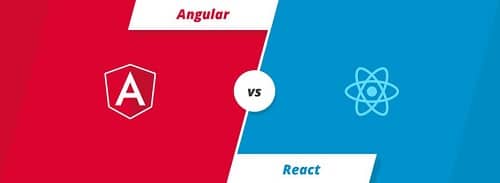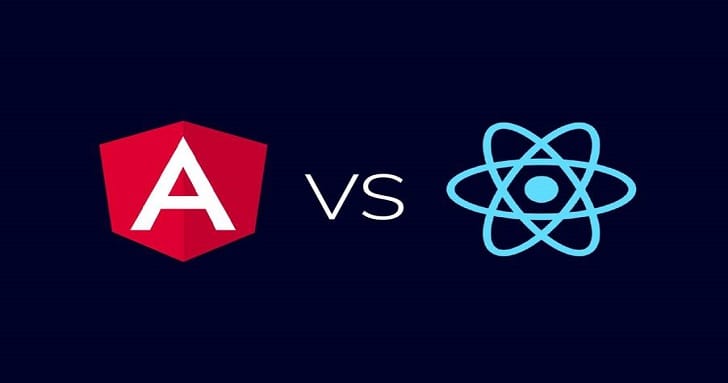Choosing the right framework can be very confusing, especially when you’ve come up with tons of ideas for how easy it is to meet the requirements of your current project.
The application interface should be comfortable and user-friendly. There is a lot of data on the net for comparing React and Angular. There are opinions that strongly oppose comparing the React library and the Angular framework.
A React Native development company is ready to answer some questions about comparing Angular and React.
Our company in no way says that you should definitely choose only one or the other. We will just give you some food for thought about the strengths of these technologies.
Before we start a technical comparison, we need to know how common these technologies are among customers and suppliers. Because finding skilled developers in your neighborhood is just as crucial as choosing the correct technology. The number of openings on special resources is a good indicator. Without a reference to the region, the statistics are averaged for each location.
What is Angular?
Angular is a typescript-based mobile and desktop web development framework. It comes with a huge number of pre-installed functions and libraries. It is updated on a regular basis to reflect the most recent happenings.
What is React?
React is a comparable open-source package with JavaScript support. Front-end development is done with it. Developers can easily construct sophisticated layered interfaces as well as speedy programs that scale across platforms.
Comparing Angular and React
React is built on the JavaScript programming language. However, it still uses JSX to create its templates, which causes a lot of controversy around this issue. Some people praise JSX and describe it, in contrast to JavaScript, as nimble and secure, simple.
TypeScrip is the core and standard language for Angular. Decorators, interfaces and static typing may all be supported by the framework thanks to it. As a result, static analysis is possible. Without TypeScript, this technology offers a lot of choices and is quite difficult to utilize.
Angular is used by developers to create both basic single-page applications and sophisticated multi-tier business projects.
React may also be used by developers to design components for any application’s user interface.
Reasons for choosing Angular
Now let’s discuss what are the advantages of Angular and for what purposes you should choose it.
Choose Angular when:
- You’re working on a large-scale single-page online app.
- There will be a lot of features and live to program in the app.
- Your objective is to complete a long-term project.
- Instead of creating a native or cross-platform mobile app, create a federated or consistent online app.
Scenarios describing using Angular:
- The many features are just one of the benefits Angular has. When it comes to developing data exchange routes, they are very efficient. The creation of an application, the addition of files, and the overall debugging of the project are all simple tasks for Angular.
- The ability to execute components in parallel has a substantial impact on the amount of time spent on a project.
- The productivity of your development team will skyrocket with Angular and its use in software development.
Top brands using Angular:
- PayPal.
- Upwork.
- Localytics.
Reasons for choosing React
Choose React when:
- You’ll need a modular interface framework for your application.
- You’re seeking a solution that’s tailored to your needs while yet leaving an adequate area for your project.
- Your project is a single-page application, such as a chat, data visualization, or an online game.
- You’ve decided to run an SEO campaign.
- Then you want to use React Native to create a cross-platform mobile app.
React scenarios:
- External components must be integrated to achieve interactive functionality.
- Because state containers are there, you can create scalable apps more quickly.
- Automatic JSX to Javascript and vice versa conversion.
- A code builder, such as a web pack, will be required.
- Use of a URL router library is possible.
Top brands using React.js:
- Netflix.
- The New York Times.
React and Angular architecture

There is a component structure in both technologies. They do, however, have a huge disparity between them. Let’s look at it more closely.
React is mostly concerned with layers. It does not specify the application’s structure. React components are nothing more than JS functions. You have more room if you create a response stack. However, there is a significant issue here. Locate all the project’s structural elements. This may be remedied to some extent by developing a React app that sets up the project.
The component hierarchy in Angular is complicated. Assets and structures, for example, are shown as a single entity. The NgModule system is used to build Angular apps, which are modular. The following is a list of component groups:
- Create an HTML template using angular markup.
- Create component classes to manage these models.
- Adding application logic to the service.
- A combination of components and services in a module.
Unlike React, Angular provides a consistent framework without lazy loading.
Improving performance with ReactJS and Angular
You’ve probably heard about React’s good track record of improving performance. But we’re sure you’ve heard about Angular’s successes in this regard, too.
The performance gain comes from embracing everything that can influence the optimization of coding methods. This is taken into account when evaluating the performance implications of React and Angular.
Angular provides a technique that is better at memorizing and may be used to recalculate data that has already been computed.
React components have long won the love of web designers for features such as performance enhancements and optimized coding techniques. The React library is renowned for its flexibility and reusability of components.
Is Angular better than React?
Yes, it will be better when used correctly. If you need to develop a corporate business application with complex features, then Angular is undeniably better suited for this.
But don’t diminish the benefits of React. His specialization in creating great interface components for users, as well as being able to be used on different platforms, makes him indispensable for creating diverse applications, such as single page websites.

